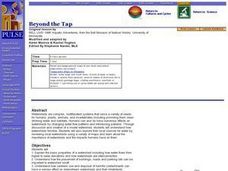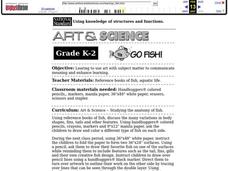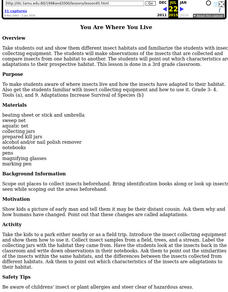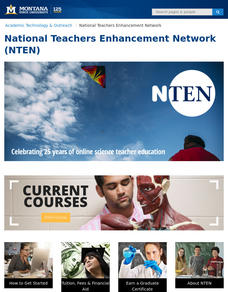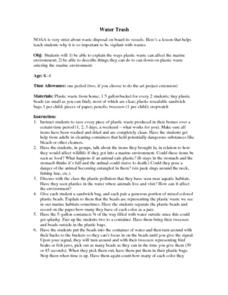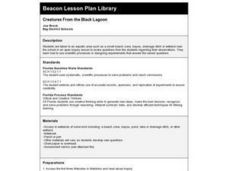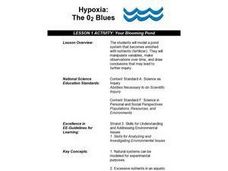Curated OER
Critters of the Water
Learners examine different organisms in various marine habitats. They identify any adaptations that have allowed the organisms to survive. They develop an imaginary organism and describe its life cycle.
Curated OER
Our Changing Environment-- A Demonstration
Students observe and describe changes in an environment when some of the components are changed. They recognize the process of succession by
preparing a miniaturized environment in which a variety of plants and seeds are grown.
Curated OER
Living Organisms
First graders investigate living things that are part of a class aquarium. They make observations and answer guided questions about each organism. Students read a Science textbook and engage in a class discussion about the content. Then...
Curated OER
Missing Macroinvertebrates
Students investigate the concept of a macroinvertebrate. They observe the presence of increases or decreases in population in order to test for factors that contribute to the extinction of a species. Students predict the likelihood of...
Curated OER
Beyond the Tap
Students explain the basic properties of a watershed including how water flows from higher to lower elevations and how watersheds are interconnected. They comprehend how the placement of buildings, roads, and parking lots can be...
Curated OER
Roaming Biomes
Students use the Internet to research the capabilities of earth-observation satellites. Using the information, they write a report on how remote-sensing technology is used to measure the impact of climate change. They identify the...
Curated OER
Dragonflies and Damselflies
In this dragonfly and damselfly worksheet, students describe the differences between the two then label the head, thorax, and abdomen of each.
Curated OER
Wetlands/Watershed Model
Students make a model that will demonstrate the flow of surface water across the land in Texas and how materials that originate many miles away can end up in the wetland along the coast.
Curated OER
There Are Algae in Your House!
Students demonstrate that, although we sometimes can neither smell nor taste them, many ingredients in our foods and household products come from the sea. They also investigate food eat to determine algae derivatives they contain.
Curated OER
Go Fish
Students use art with subject matter to communicate meaning and enhance learning.
Curated OER
Swimming Survivor Challenge IV
Young scholars practice using a mask, snorkel, and fins to collect items from the bottom of a pool. They should swim as well as hold their breath while going under water.
Curated OER
You Are Where You Live
Students explore where insects live and how they have adapted to their environment.
Curated OER
Investigation 11 - Utah Fish
Fourth graders examine a particular Utah fish and then create a poster that shares what they learned. They access websites imbedded in this plan to aide them in their research.
Curated OER
Whale Form and Function
Students identify similarities and differences in specializations of morphology among a variety of cetaceans and approximate the reasons for these specializations.
Curated OER
Life in Streams and Ponds
Students collect microorganisms, demonstrate correct laboratory/Gram stain procedure, and design and construct tables to organize data.
Curated OER
Water Trash
Students explain the ways plastic waste can affect the marine environment. They are able to describe things they can do to can down on plastic waste entering the marine environment.
Curated OER
Creatures From the Black Lagoon
Seventh graders make observations at a beach zone, bayou, pond, lake or drainage ditch, or other wetland.
Curated OER
Teaching about the Chemistry of Oxygen Solubility
Learners explore solubility of gases in water, Henry's Law, LeChatelier's Principal, and supersaturation of gases in water.
Curated OER
Temperature and Brine Shrimp Eggs
Students determine the optimal temperature at which brine shrimp eggs hatch and develop. They evaluate the changes, if any, which occur in a brine shrimp culture at various temperatures.
Curated OER
Water Quality and Nitrates & Phosphates
Students examine the effects of nitrates and phosphates on the dissolved oxygen levels in different water sources. In this series of 3 lessons, they consider the reasons for nitrate and phosphate level increases and their effects on...
Curated OER
Determination of Overall Water Quality Using a Quantitative Macroinvertebrate Survey
High schoolers examine water samples from a local stream. They identify various types of macroinvertebrates found in that water ecosystem and perform a quantitative macroinvertebrate survey to determine the stream's water quality.
Curated OER
Your Blooming Pond
Pupils model a pond system that becomes enriched with nutrients (fertilizer). They manipulate variables, make observations over time, and draw conclusions that may lead to further inquiry. They, in groups, simulate a pond environment.
Curated OER
Renkly Relief/Collage Painting
Students study the use of texture, and rhythm as a principle of design when showing movement in a painting.
Curated OER
Urban Impact on Chollas Creek (California): A Field Study
Students, in groups, take samples from a creek and keep a field journal on their samples. They also perform tests on their samples.
Other popular searches
- Aquatic Plants
- Aquatic Birds
- Aquatic Biomes
- Aquatic Ecosystems
- Aquatic Plants and Animals
- Aquatic Life
- Aquatic Environment
- Aquatic Wildlife
- Aquatic Life Basic Needs
- Aquatic Habitats
- Aquatic Chemistry
- Aquatic Science






